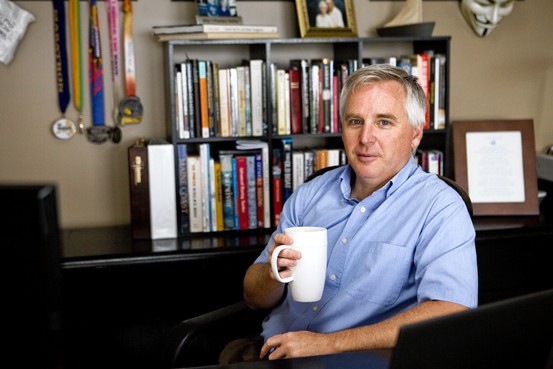Supreme Court Ruling on Public Invocations Gives Atheists a Prayer
< < Go Back
By Julia Harte,
Nonbelievers Deliver Invocations at Public Meetings; Next Up, Pastafarians.
At a recent meeting of the Osceola County, Fla., board of commissioners, many attendees bowed their heads in silence as they listened to an invocation delivered by an atheist.
“Habit, I guess,” says David Williamson of Central Florida Freethought Community, who, in lieu of calling on the almighty, invoked the spirit of goodwill during his roughly one-minute speech.
Mr. Williamson, the first nonbeliever invited to perform the county ritual, is among a handful of atheists around the country who have given or are scheduled to give invocations before local-government meetings. The speeches have championed self-government, the human condition, intellectual openness and minority viewpoints.
At the same time, several town boards that had done away with prayers that include references to specific faiths are trying to revive them.
The groundswell is a reaction to a U.S. Supreme Court ruling in May that sanctioned prayers before meetings of the town board in Greece, N.Y. The court rejected arguments that the overwhelmingly Christian prayers gave preference to one faith and violated the First Amendment, which prohibits the government from establishing an official religion.
The decision was a blow to nonbeliever activists, but it also created an opportunity. Justice Anthony Kennedy, who wrote the 5-4 ruling, emphasized the importance of inclusion, holding the town to a policy that permits “a minister or layperson of any persuasion, including an atheist,” to give the invocation.
And so on June 16, Mr. Williamson, who lives outside Orlando, found himself for the first time at an Osceola County board meeting, standing behind a lectern in a navy blazer.
“Through the millennia we as a society have learned the best way to govern the people is for the people to govern themselves,” said Mr. Williamson, in his short invocation, which drew largely on themes of community and service.
“Democracy does not mean a tyranny of the majority,” [Tim] Earl told the council in Portage, Mich. “If we ignore minority viewpoints, we foster division and dissent within the community, which only grows worse as demographics change.”
The town board at the center of the Supreme Court case is also scheduled to receive an invocation from an atheist, Dan Courtney of Rochester, N.Y., at the body’s Tuesday meeting.
The former president of the Freethinkers of Upstate New York, Mr. Courtney says he plans to give a four-minute speech highlighting the notion that the country was founded on the authority of the people, and the importance of ensuring Americans of all types are heard.
He will be the first atheist to address the Greece town board. Before the Supreme Court ruling, the town board allowed a Wiccan priestess to deliver an invocation.
“In a sense, it has opened the door for a bit of a free-for-all,” he says.
The interpretation of the Supreme Court’s ruling as endorsing inclusion cuts both ways. Some school boards, for instance, see the ruling as supporting prayer before their meetings, too—a view the American Civil Liberties Union and other groups have rejected.
More From The Wall Street Journal (subscription required):




